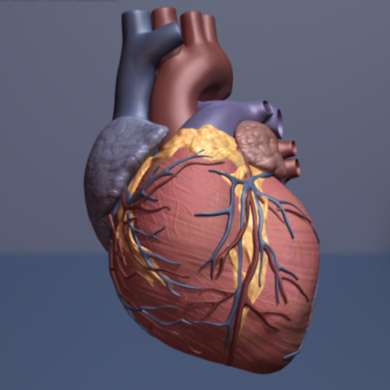When exercise is unhealthy for the heart

Endurance exercise accelerates the development of heart problems in individuals with a particular genetic mutation, a new study in American Journal of Physiology—Heart and Circulatory Physiology reports.
Arrhythmogenic ventricular cardiomyopathy (AVC) is the most common heart condition that causes sudden cardiac death during intense exercise. The study found that in mice with a mutated version of desmoplakin, a protein that helps maintain the structure of the heart wall, exercise made the heart walls come apart sooner, leading to earlier development of AVC. According to lead researcher Jeffrey Towbin, MD, the findings confirm the role of the mutation in the development of AVC and offer insight into how to best manage exercise in individuals with AVC, which currently has no standardized strategy.
The cells in the heart wall are stacked in interlocking layers like bricks in a brick wall. They are attached to each other by links called desmosomes that dot the surface of the cells. Exercise can overstretch the heart wall, but these links keep the cells from disconnecting from each other and the heart wall from coming apart. Desmosomes are made up of several proteins, including desmoplakin. Defects in the proteins, as in AVC, weaken the cell-cell links. The cells do not withstand the extra stretch from exercise and detach from each other. Scar tissue fills the gaps between the disconnected cells, further reducing the heart wall's ability to withstand increases in workload such as exercise.
Several studies observed that mice with a mutated form of desmoplakin developed the same heart problems seen in patients with AVC. In this new study, researchers at the Cincinnati Children's Hospital Medical Center discovered endurance exercise led to earlier onset of AVC symptoms in mice with the mutated desmoplakin. Moreover, the desmosomes started coming apart before changes in heart function were detected. Exercise also changed the signaling in the molecular pathway that promoted growth of new cells and prevented deposition of fat, the Wnt-β-catenin pathway, offering an explanation for the accelerated development of AVC.
The study suggests that changes in the cell-cell links can be detected before alterations in heart function occur. This can help identify individuals with the mutation before they develop AVC symptoms, Towbin says, opening the possibility of better strategies to prevent exercise-induced complications. The study also suggests that drugs targeting the Wnt-β-catenin pathway may help patients with AVC, he says.
The study "Accelerated cardiac remodeling in desmoplakin transgenic mice in response to endurance exercise is associated with perturbed Wnt/β-catenin signaling" is published ahead-of-print in American Journal of Physiology—Heart and Circulatory Physiology.
More information: American Journal of Physiology, ajpheart.physiology.org/conten … .00295.2015.full.pdf



















